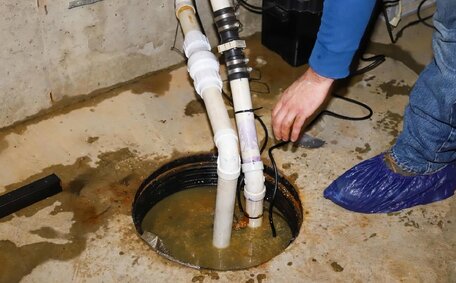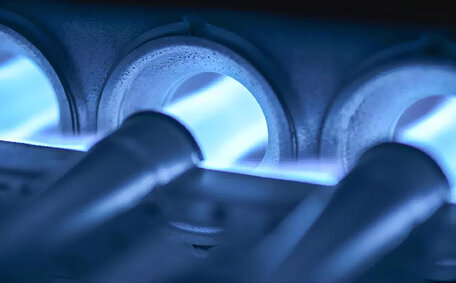Recognizing the signs of a gas leak
Promptly identifying a gas leak is vital for safety. Undetected, gas leaks can result in explosions, fires, carbon monoxide poisoning, or suffocation.
Natural gas is odourless, so gas companies add a distinctive rotten-egg scent to aid in its detection. Be alert to symptoms that signal a potential gas leak:
- A strong smell reminiscent of rotten eggs inside or near your property, often a telltale sign of a gas leak.
- Hissing, whistling or roaring sounds emanating from a gas appliance or pipes.
- Dirt or dust blowing from a spot positioned near gas line or connected appliance.
- Bubbles in standing water over a gas line.
- Flames coming from the ground or burnt patches on the ground over a gas line.
- Dead or dying vegetation in an otherwise moist area over a gas line.
Experts urge immediate action upon detecting the characteristic odour of a gas leak, along with any accompanying signs. Evacuate your property, contact emergency services on 000 and call your local gas provider from a location safe to do so outside. Attempting to find the source leak yourself risks sparks that could ignite leaking gas.
What to do immediately if you smell gas inside
If you detect the distinctive smell of gas in your home, it’s critical to know the immediate steps to take.
- Avoid turning electrical devices or lights on or off to prevent sparks that could ignite the gas.
- Open windows and doors for fresh air to disperse the gas, but ensure all gas appliances are shut off and it’s safe to do so first. Dont use exhaust fans.
- Prioritize safety, turn off gas and electrical devices, and swiftly evacuate the building with all occupants and pets.
- If possible, quickly turn off the gas at the main valve, typically located outside or by your meter. Use an adjustable wrench to turn off your main gas; ensure you do use appliances only when it’s guaranteed safe.
- After evacuating, dial 000 from a safe distance if you smell gas, and provide a precise description to emergency services.
- Additionally, report gas leak to your local gas networks via their emergency line while outside your house. A technician is often needed to shut down the main gas supply.
- Stay clear of the affected area until emergency services verify the gas leak is managed. A gas leak can lead to explosions if ignited.
Consult a licensed gas technician if you suspect a leak. Preventive measures, such as annual inspections by licensed professionals, are crucial.
Evacuating your home safely
In the event of a suspected gas leak that requires an evacuation, safety must take precedence. Avoid panic as it may lead to dangerous situations; remain calm and composed.
Ensure the evacuation of all home occupants, including children and pets, as a primary safety measure in case of a gas leak. If safe, assign one person to check the entire home to confirm everyone has been evacuated. Choose a predetermined outdoor meeting spot a safe distance from the home where everyone should gather.
Do not try to collect personal belongings or valuables, as this wastes precious evacuation time. Steer clear from utilising mobile phones or toggling switches for lights or appliances.
Exit the home without delay and wait at the designated meeting spot for instructions from emergency services before attempting to re-enter. Even if the gas smell seems to have dissipated, professionals need to thoroughly check your home to assess how safely you can return.
A pre-established emergency plan, with defined steps, escape routes, and meeting points, ensures a swift and orderly evacuation during a gas leak.
Ventilating your home after a gas leak
After gas leak technicians have addressed a leak and deemed your home safe, the next vital step is proper ventilation. The presence of gas inside my home can linger, so it’s crucial to thoroughly air out spaces.
Open all windows and doors to dispel any trapped gas and encourage air exchange. Utilise floor and window fans to maximise fresh air circulation if the smell of gas persists. It’s important to ventilate this way for 2-3 hours upon re-entry, then continue by keeping windows open for 24-48 hours.
If the pungent gas smell still lingers somewhat, continue ventilating and call the gas company to recheck connections. Never ignore remnants of a smell as it likely indicates a gas leak coming from remaining traces.
Never enter a home in case of an event gas leak without proper approval, and even once clearance is given, maintain awareness for any persisting gas odour. If gas odour reemerges, evacuate immediately, and alert emergency services and your gas supplier anew.
When to call emergency services
In the event of a gas leak, it’s imperative to contact emergency services or your gas company without delay when:
- You smell gas outside or otherwise detect a gas leak inside or outside your home
- You suspect you may have a carbon monoxide leak
- Someone begins to feel unwell from potential gas exposure
- You are unable to safely turn off the gas or stop the leak yourself
- There are visible signs of a leak like debris blowing from a gas line
- Gas appliances are malfunctioning, damaged or emitting fumes
Upon evacuating, immediately call 000 for emergency services from a safe outdoor location. Explain the situation clearly and accurately to your local gas company. Also, contact your gas distributor or utility provider using their 24-hour emergency number to despatch a technician.
- Your name, address and contact details
- Location of the leak or issue if known
- Any visible signs or safety hazards
- Number of people evacuated
Emergency services and gas safety technicians will respond promptly, ensuring safety and resolving any issues with your home’s gas supply.
How to turn off the gas supply safely
If safe, locate the main gas shut-off valve, often near the gas meter, to turn off the main gas supply. The gas supply typically shuts off near your meter outside, but it may also be situated indoors near appliances. Use an adjustable wrench to gently turn the valve a quarter turn perpendicular to the pipe until it is fully closed.
If the valve is stiff, do not force it; instead, call for professional assistance. Call a licensed gas fitter for assistance in shutting it off properly. Note other visible signs of leaks.
Ensure turning off your gas supply via the main valve is communicated along with your exact location and details of any issues. Turning off the main gas supply stops flow throughout the system until repairs can be made.
If you do not feel confident performing this safely due to leaks near the metre, evacuate immediately and notify emergency services and your gas provider.
They can do gas shut off remotely in some cases or will despatch technicians. Never disregard a gas leak; swift action is paramount to ensure your safety during such an emergency.
Preventing gas leaks through maintenance
Routine servicing of your gas appliances is a preventive measure against perilous gas leakages. Have all gas appliances in your home inspected annually by a licenced technician. They will clean and service appliances, check for issues like corrosion or cracks, ensure proper ventilation, and detect gas leaks using leak detection fluid, addressing the potential to smell gas your home appliances could produce, making any necessary repairs.
Look for signs like dead vegetation, dirt blowing from a gas pipe, or damage from diggers or tree roots. Additionally, ensure vents and chimneys are kept clear and watch for gas lines being impacted by appliance faults, such as on a gas stove with a pilot light changing colour or shape.
Report any issues immediately.
Employing these safety tips, along with qualified technicians and vigilance, stops small problems from escalating into safety emergencies. Paddington Plumbing can help with comprehensive servicing and detection of leaks for your home business in the Paddington area. You’re encouraged to give us call to converse about the upkeep necessities of your gas setup.
Installing gas detectors in your home
Installing gas detectors is an essential safety step to promptly alert you of hazardous gas leaks. Install battery-operated or plug-in carbon monoxide and natural gas detectors on each level of your home, especially near bedrooms and high-risk areas.
Ensure detectors are compliant with australian gas standards and designed to alert you swiftly should a leak compromise your safety. Combination carbon monoxide and lpg natural gas detectors are available. Test detectors monthly by pushing test buttons and replace them every 5-7 years or according to manufacturer guidelines.
With multiple detectors in place, you’re more likely to notice the signs gas even if it shifts locations, ensuring full coverage. Hardwired detectors, tied to your home’s electrical system, offer additional protection and commonly feature battery backups.
Paddington Plumbing can guide you in choosing suitable gas leak and carbon monoxide detectors tailored to your home’s design. We also offer full installation services to ensure detectors are properly positioned and connected. This gives you assurance that your loved ones are safeguarded.
Installing gas detectors, maintaining them properly and replacing expired devices helps provide alerts to leaks as early as possible. This critical early warning paired with the right steps to take for gas leak first aid can prevent tragedy and save lives.






